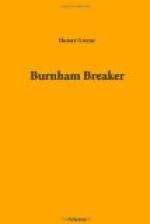“I think not so long as that. He was unusually stubborn. I told him he could come out as soon as he would promise obedience. He remained in there of his own accord.”
“Appeared to like it, did he?”
“I can’t say as to that.”
“For how long a time did you say he stayed there?”
“Oh, I think from one afternoon till the next.”
“Did he have anything to eat during that time?”
“I promised him abundance if he would do as I told him.”
“Did he have anything to eat?” emphatically.
“No!” just as emphatically.
“What was it he refused to do?”
“Simply to go on a little errand for me.”
“Where?”
“To the house of a friend.”
“For what purpose?”
“To get some jewelry.”
“Was the jewelry yours?”
“I expected to purchase it.”
“Had it been stolen?”
“Not to my knowledge.”
“Did the boy think it had been stolen?”
“He pretended to.”
“Was that the reason he would not go?”
“It was the reason he gave.”
“Have the city police found stolen goods on your premises?”
“They have confiscated goods that were innocently purchased by me; they have robbed me.”
“Did you compel this boy to lie to the officers when they came?”
“I made him hold his tongue.”
“Did you make him lie?”
“I ordered him not to tell where certain goods were stored in the house, on pain of being thrashed within an inch of his life. The goods were mine, bought with my money, and it was none of their business where they were.”
“Did you not command the boy to say that there were no such goods in the house?”
“I don’t know—perhaps; I was exasperated at the outrage they were perpetrating in the name of law.”
“Then you did make him lie?”
“Yes, if you call it lying to protect your own property from robbers, I did make him lie!”
“More than once?”
“I don’t know.”
“Did you make him steal?”
“I made him take what belonged to us.”
“Did you make him steal, I say!”
“Call it what you like!” shouted the angered and excited old man. He had become so annoyed and harassed by this persistent, searching cross-examination that he was growing reckless and telling the truth in spite of himself. Besides, it seemed to him that Goodlaw must know all about Ralph’s life with him, and he dared not go far astray in his answers.
But the lawyer knew only what Craft himself was disclosing. He based each question on the answers that had preceded it, long practice having enabled him to estimate closely what was lying in the mind of the witness.
“And so,” continued Goodlaw, “when you returned from one of your trips into the country you found that the boy had disappeared?”




